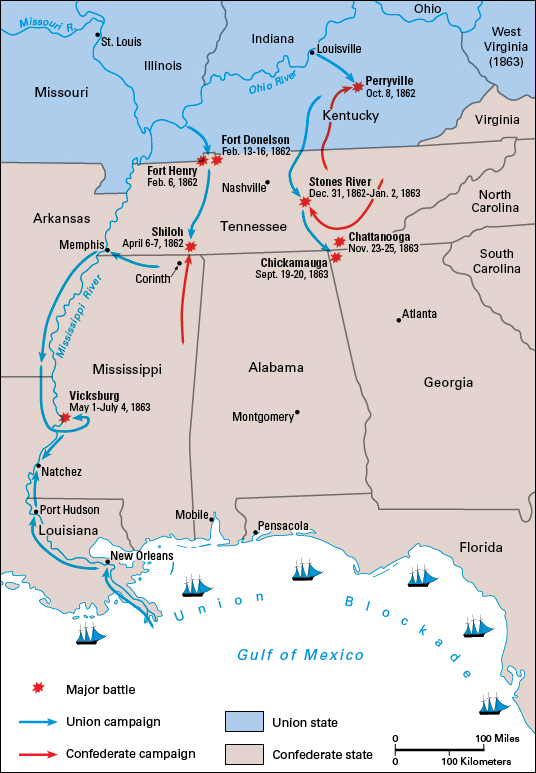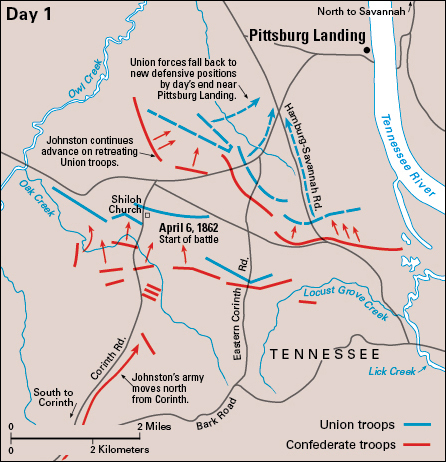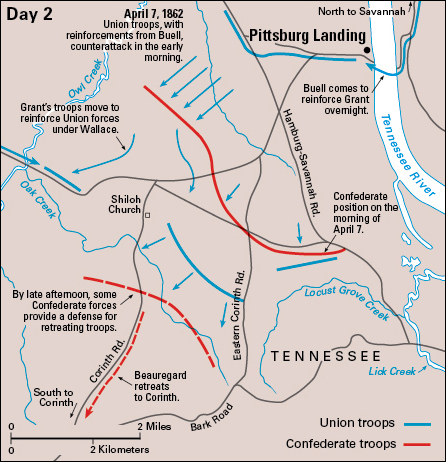Shiloh, Battle of, was one of the fiercest battles of the American Civil War (1861-1865). The battle, named after a church on the battlefield, was fought in southwestern Tennessee on April 6 and 7, 1862. Confederate forces led by General Albert Sidney Johnston surprised and almost destroyed a Union army led by General Ulysses S. Grant. But Grant held his lines and, with the help of reinforcements, eventually defeated the Confederates. The battle is also called the Battle of Pittsburg Landing, after a nearby village.

In February 1862, Union forces led by Grant captured Fort Henry and Fort Donelson, both in northern Tennessee. The loss of these forts forced Johnston’s Confederate troops to retreat south to Corinth, Mississippi. General Henry Halleck, who had become commander of most Union forces from Ohio to Kansas, ordered Grant to move down the Tennessee River. Halleck also told General Don Carlos Buell to bring troops to join Grant. Grant and some 40,000 men moved to Pittsburg Landing, Tennessee, a village about 20 miles (32 kilometers) north of Corinth. An additional 7,500 Union troops, led by General Lew Wallace, were camped at Crump’s Landing, about 5 miles (8 kilometers) north of Pittsburg Landing.
Johnston and his second-in-command, General Pierre G. T. Beauregard, decided to strike Grant at Pittsburg Landing before Buell’s forces could arrive. Johnston and his Confederate army of some 44,000 troops left Corinth on April 3 and planned to attack Grant on April 4. However, because of rain and other problems, the attack was delayed.
Around 6 a.m. on April 6, thousands of Confederates poured out of the woods near Shiloh Church and attacked the Union encampments (camps). For several hours, the Confederates drove the Union soldiers toward the Tennessee River. Grant himself, who had been in Savannah, Tennessee, the night before, arrived at Pittsburg Landing at about 9 a.m. He sent for Wallace and his 7,500 troops. But Wallace took the wrong road and did not arrive at the battlefield until after the fighting had ended that day.

The heaviest fighting took place near the small log meeting house of Shiloh Church and for several hundred yards on either side of the nearby Corinth Road. There, Union troops led by Generals William T. Sherman and John A. McClernand fought fiercely and gave up ground slowly. Confederate commanders, hearing the sounds of intense battle in this area, shifted most of their army there. Another large part of the Confederate army advanced along the Hamburg-Savannah Road, east of the Corinth Road. But the Southerners were blocked by Union General Stephen Hurlbut’s troops, who were holding a position near the peach orchard. Johnston was killed trying to rally his troops there. Late in the afternoon, the Confederates finally drove back the defenders of both roads and captured several thousand other Union troops who had been holding the line between the roads.
Grant’s remaining Union troops built a defensive position around Pittsburg Landing. Beauregard, who replaced Johnston as commander of the Confederate army, decided not to attack Grant’s position. That night, Beauregard sent a telegram to the Confederate capital in Richmond declaring that the South had won the Battle of Shiloh.
During the night, Grant received about 25,500 reinforcements—18,000 from Buell and 7,500 from Wallace. Beauregard, unaware that the reinforcements had arrived, planned on finishing Grant’s army on April 7. However, that day, Grant attacked the Confederates with his now much larger army. In the afternoon, Beauregard ordered a retreat back to Corinth.

Over the course of the two days of fighting, the Union suffered about 13,000 casualties, and the Confederates nearly 11,000. After the battle, many Northerners urged President Abraham Lincoln to replace Grant. They blamed Grant for the heavy losses and for being surprised by the Confederates. Lincoln refused to replace Grant, saying, “I can’t spare this man—he fights!” Many Southerners blamed Beauregard for the loss because he failed to attack Grant on the night of April 6. After Shiloh, Halleck took command of Grant’s and Buell’s forces. He moved southward and forced Beauregard to evacuate Corinth.
See also Beauregard, Pierre Gustave Toutant ; Civil War, American ; Grant, Ulysses S. ; Halleck, Henry Wager ; Johnston, Albert Sidney ; Wallace, Lew .
